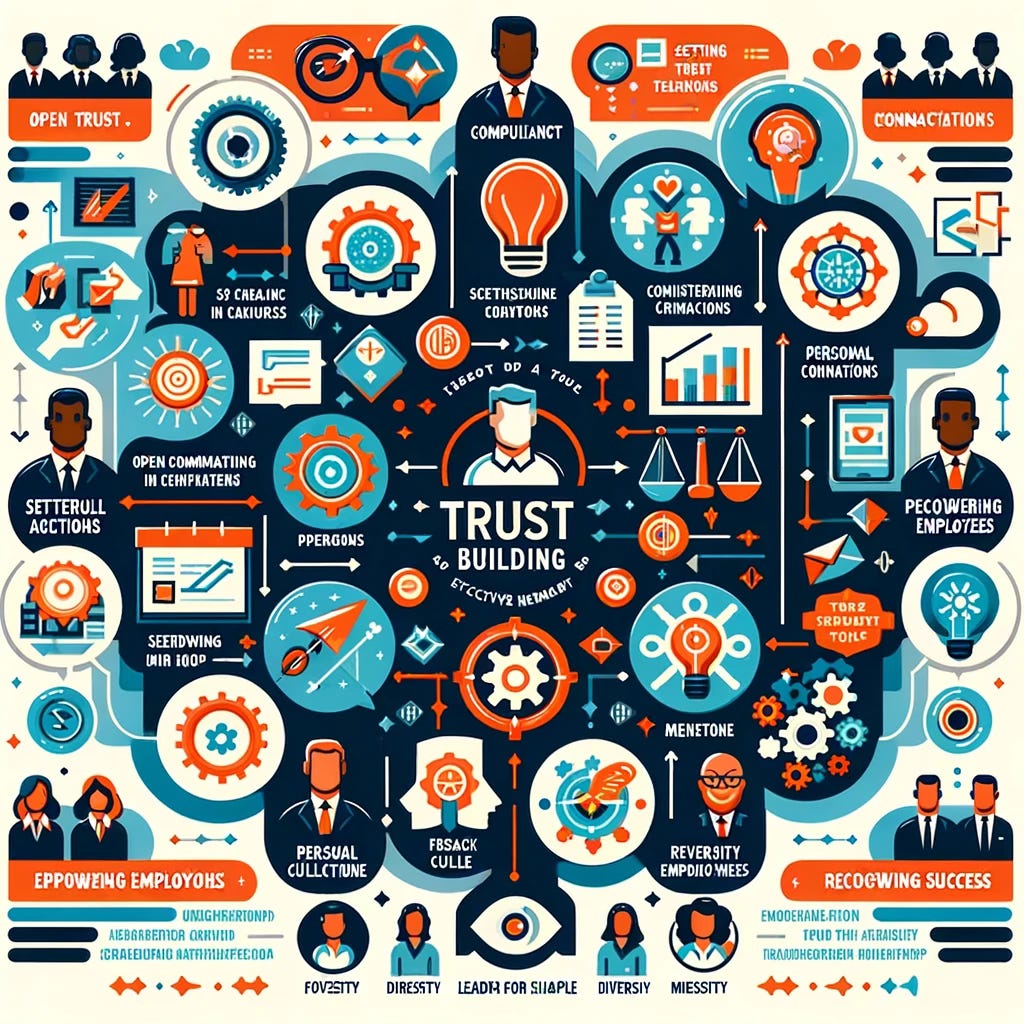Unlocking the Power of Trust in Management 🌟
👋 Hello, Leaders and Managers! In the whirlwind of today’s work environment, trust is not just nice-to-have; it's a must-have. It's the foundation of strong professional relationships, driving collaboration, productivity, and satisfaction. Let's explore how to build this crucial asset in your team.
🔍 TL;DR: Uncover effective strategies for fostering trust in your workplace. From open communication to empowering your team, learn how to create a space where trust flourishes, and teams reach new heights.
Why Trust Matters More Than Ever
In our hyper-connected world, trust is the cornerstone of all successful interactions. It's about dependability, integrity, and creating an emotional bond. In professional settings, trust is critical for facilitating open communication, collaboration, and overall productivity. When trust is present, employee engagement improves, leading to a more motivated and committed workforce.
Charting the Course in Trust Building
Building trust doesn’t happen overnight. It’s a journey that requires patience, effort, and genuine dedication. Recognize that each team member's experience and background will affect their trust level. Some may extend trust easily, while others, perhaps shaped by past negative experiences, may take longer.
🖼️ Suggested Visual: A journey map illustrating the gradual process of trust-building, highlighting key actions and milestones along the way.
Blueprint for Trust: Key Managerial Behaviors
To cultivate a culture of trust, consider these pivotal behaviors:
Open Communication and Clarity: Keep the lines of dialogue open and transparent. Honesty and clarity in communication are key to building a trusting environment.
Example: A manager schedules regular team meetings and one-on-one sessions to discuss project updates, address concerns, and share company news. They encourage team members to voice their opinions and questions, ensuring transparency and honesty in all communications.Consistency in Actions and Admitting Mistakes: Be consistent in your reactions to different situations and own up to errors. This builds respect and integrity.
Scenario: After a project deadline is missed, the manager openly admits their oversight in planning and takes responsibility. They also maintain a consistent approach in handling similar situations in the future, thereby building respect and integrity among the team.
Setting Clear Expectations and Following Through on Commitments: Ensure everyone knows what’s expected and reliably meet your promises. This builds confidence in your leadership.
Example: A leader sets achievable targets for their team and communicates these goals clearly. They follow up regularly and meet their own deadlines, demonstrating reliability and reinforcing confidence in their leadership.
Personal Connections and Work-Life Balance: Take time to know your team beyond work and advocate for a healthy work-life balance. Genuine interest in their lives and respecting personal boundaries foster trust and collaboration.
Scenario: A manager takes an interest in their team members' hobbies and family life, and respects their need for downtime. They advocate for flexible working hours and discourage after-hours work, fostering a healthy work-life balance.
Empowering Employees and Providing Feedback: Give your team autonomy and the necessary resources to succeed. Encourage a culture where feedback is welcomed and acted upon, demonstrating a commitment to growth and development.
Example: An executive delegates significant projects to team members, providing them with the autonomy to make decisions. They offer constructive feedback and acknowledge individual contributions, promoting a culture of growth and development.Recognizing Success and Diversity: Celebrate achievements and foster a workplace that values diverse experiences. When everyone feels respected and included, collaboration thrives.
Scenario: A company celebrates team achievements and individual milestones regularly. They also organize events and activities that recognize and embrace cultural diversity, making everyone feel valued and included.
Leading by Example and Mentorship: Model the behaviors you want to see and provide guidance and mentorship. Honest, integrity, respect, and empathy are crucial in building a trustful culture.
Example: A senior leader consistently exhibits honesty, integrity, and empathy in their actions. They also invest time in mentoring junior employees, guiding them through career development and personal growth.
Judicious Use of Managerial Authority and Navigating Confidentiality: Use your authority sparingly and handle sensitive information with care. Be clear about the boundaries of confidentiality.
Scenario: A manager uses their authority to make critical decisions but does so sparingly and with clear communication. They handle sensitive employee information confidentially, setting clear boundaries on what is shared and with whom.
Seeking Consent: Before providing feedback or suggestions, ask for permission. This respects individual autonomy and fosters a more egalitarian environment.
Example: Before offering feedback in a performance review, a manager asks the employee if they are open to receiving it. They respect the employee's response, fostering an environment of mutual respect and understanding.
The Trust Transformation Journey
Embracing these trust-building strategies can transform your leadership and your team’s dynamics. It’s a journey of continuous growth, adaptation, and nurturing. Start cultivating trust today and watch as your team’s performance and morale soar!
📣 Are you ready to embark on this transformative journey? Begin implementing these strategies today, and witness the positive ripple effect it has on your team and your leadership style. Let’s build trust, let’s build success! 🚀
🚀 I provide an Engineering-Leader-as-a-Service to StartUps and ScaleUps
🏅I mentor aspiring and experienced Engineering Leaders
💡I write about Startup Life & Engineering leadership
🔔Ring the bell on my profile to see when I post
👉 View my profile to find out more: Serdar Mustafa's LinkedIn



